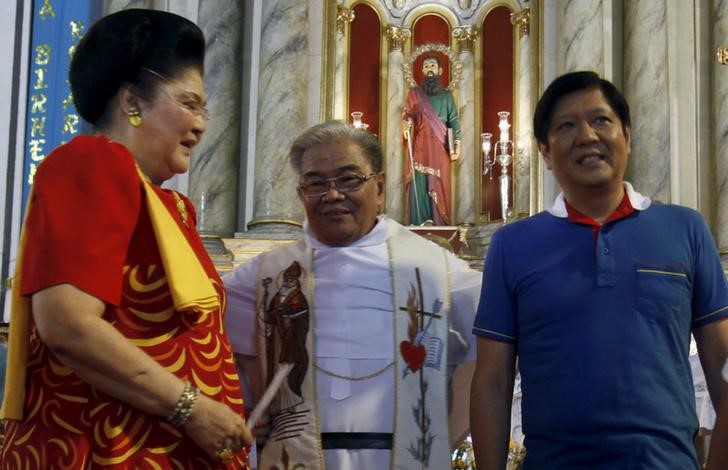By Rosemarie Francisco
MANILA (Reuters) - Election season is under way in the Philippines and investors are in for a wild ride of power-politics dominated by entrenched family dynasties, whose machinations will leave little room for serious debate on badly needed reforms.
The wife, son, daughter and nephew of late dictator Ferdinand Marcos will all run in the May 2016 elections, joining a host of other privileged candidates from elite families seeking to keep their hold on power in local and national politics.
"The problem with elite politics is there is no programme or platform, it's all power," said Ramon Casiple, executive director of the advocacy group Institute for Political and Electoral Reforms.
The family of Vice President Jejomar Binay is another high-profile dynasty, having ruled Manila's Makati financial district for nearly three decades. Binay's daughter is ending her term as congresswoman and will run for mayor in 2016, hoping to replace her brother who is facing a graft case. Her businessman husband, a political novice, will run for her seat in Congress.
Binay, meanwhile, has his sights set on replacing President Benigno Aquino.
"A lot of these political dynasties feel they own the seats that they occupy and its theirs to bequeath, to whoever family member they see fit," anti-corruption group Transparency and Accountability Network executive director Vincent Lazatin said.
"It is very disturbing."
CLAN CONNECTIONS
The leading candidate to replace Aquino, according to opinion polls, is neophyte Senator Grace Poe.
While she is not a member of a dynasty, her chances of success depend on connections such as Aquino's businessman uncle, Eduardo Cojuangco, head of the Nationalist People's Coalition.
Apart from Binay, Poe will also be up against Manuel "Mar" Roxas, grandson of the country's first post-war leader and President Aquino's favourite.
Peter Wallace, head of business consultancy Wallace Business Forum, said issues that mattered to ordinary people - the South China Sea maritime dispute with China, jobs, social services - were being drowned out by the politics of personality.
"We have had enough of these domestic families and the politicos, we are demanding change," Wallace said, calling for concrete proposals on job creation and investment.
The next president should pursue policies that will open up the economy to more foreign investment, reduce business costs, cut red tape and modernise infrastructure, foreign business chambers said in a statement last week.
About two-thirds of the outgoing Congress are the heirs of political families, even though Aquino, himself a descendant of the family that toppled Marcos in 1986, vowed to ban dynasties when he ran for president in 2010.
While Aquino abandoned his crusade after coming to office he has recently picked up the banner of reform again, backing an anti-dynasty bill that is, perhaps unsurprisingly, languishing in Congress.
His second volte-face came after his government filed graft cases against Binay family members. Even so, analysts see little hope that the bill will become law any time soon.
"There does not seem to be any real trend away from the personalisation of politics in families," said Steven Rood, regional advisor for local governance at the Asia Foundation.
